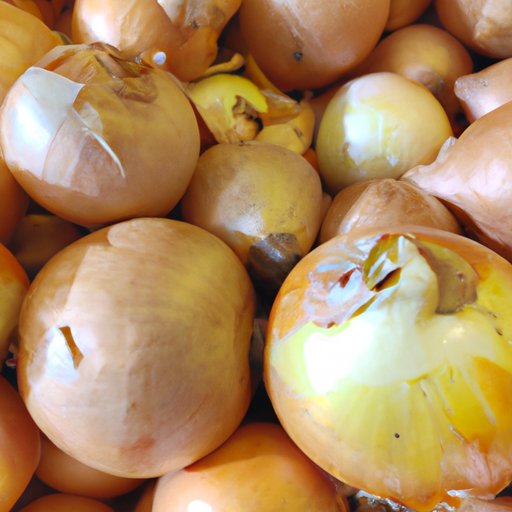Introduction
Onions are a staple ingredient in many cuisines around the world. They’re flavorful, aromatic, and incredibly versatile. But did you know that they may also offer some health benefits? In this article, we’ll explore the nutritional value of onions, their potential role in disease prevention, and how to incorporate them into your diet.

Exploring the Health Benefits of Onions
Onions are a nutrient-dense vegetable. One cup (160 grams) of raw onion contains 64 calories, 0 grams of fat, 16 grams of carbohydrates, 2 grams of fiber, and 3 grams of protein (1). It’s also an excellent source of vitamins C, B6, and K, as well as other minerals like calcium, iron, potassium, and manganese (1).
But it’s not just their nutrients that make onions so healthy — it’s also the compounds they contain. Onions are high in antioxidants like quercetin, which may help reduce inflammation and protect against chronic diseases (2). They’re also a rich source of sulfur-containing compounds, which may help prevent cancer and other illnesses (3).

How to Incorporate Onions Into Your Diet
Onions can easily be incorporated into your diet in a variety of ways. Start by substituting onions for other ingredients in recipes. For instance, if a recipe calls for celery, try using onions instead. Onions have a similar crunchy texture and mild flavor, and they’ll add extra nutrition to your dish.
You can also add onions to salads, soups, and sandwiches. Or, try roasting them with other vegetables like potatoes or carrots. Roasted onions taste great on their own, or you can use them as a topping for tacos, burritos, and pizza.
Cooking with Onions: Healthy Recipes
Here are a few delicious recipes that feature onions:
Roasted Onion Wedges
Ingredients:
- 2 large onions, cut into wedges
- 2 tablespoons olive oil
- 1 teaspoon garlic powder
- Salt and pepper to taste
Instructions: Preheat oven to 425°F (220°C). Place onion wedges on a baking sheet. Drizzle with olive oil and sprinkle with garlic powder, salt, and pepper. Bake for 20–25 minutes, or until golden brown and tender.
Caramelized Onions
Ingredients:
- 2 tablespoons olive oil
- 2 large onions, thinly sliced
- 1 teaspoon sugar
- Salt and pepper to taste
Instructions: Heat olive oil in a large skillet over medium heat. Add onions and cook until softened, about 5 minutes. Reduce heat to low and continue cooking, stirring occasionally, until onions are golden brown and caramelized, about 15 minutes. Stir in sugar, salt, and pepper. Serve warm.
Grilled Onions
Ingredients:
- 2 large onions, cut into thick slices
- 2 tablespoons olive oil
- Salt and pepper to taste
Instructions: Preheat grill to medium-high heat. Brush onion slices with olive oil and season with salt and pepper. Grill onions for 4–5 minutes per side, or until lightly charred and tender. Serve warm.
Onions & Disease Prevention: What the Research Says
Onions are linked to several potential health benefits, particularly in regards to disease prevention. Let’s take a look at what the research says:
Heart Health
Studies show that regularly consuming onions may help lower blood pressure and cholesterol levels, both of which are important for heart health (4, 5). Additionally, one study found that eating onions daily was associated with a reduced risk of coronary artery disease, a type of heart disease (6).
Cancer Prevention
Several studies suggest that onions may help reduce the risk of certain cancers. A 2012 study found that people who ate onions had a significantly lower risk of stomach cancer than those who didn’t (7). Another study showed that regular onion consumption was linked to a reduced risk of colorectal cancer (8).
Improved Digestion
Onions are high in fiber, which is essential for a healthy digestive system. Fiber helps keep your digestive tract running smoothly and prevents constipation (9). Additionally, onions contain prebiotics, which are beneficial compounds that feed the beneficial bacteria in your gut (10).
Conclusion
In summary, onions are a nutritious vegetable with a wide range of potential health benefits. They’re high in antioxidants and other compounds that may help prevent certain diseases. Plus, they’re incredibly versatile and easy to incorporate into your diet. Try adding them to salads, soups, and sandwiches, or roast them with other vegetables for a delicious side dish.
(Note: Is this article not meeting your expectations? Do you have knowledge or insights to share? Unlock new opportunities and expand your reach by joining our authors team. Click Registration to join us and share your expertise with our readers.)
